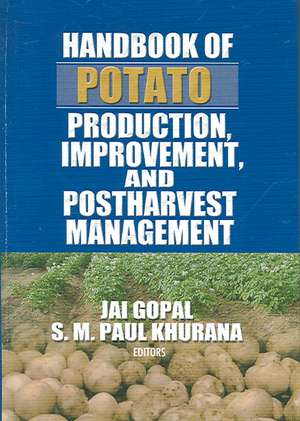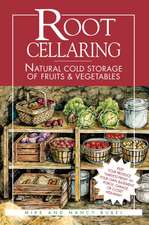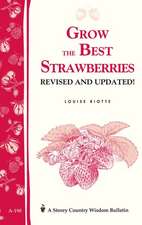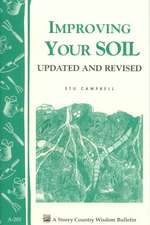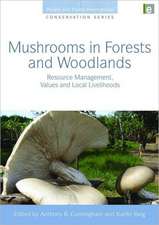Handbook of Potato Production, Improvement, and Postharvest Management
Autor Jai Gopal, S.M. Khuranaen Limba Engleză Hardback – 11 aug 2006
Potatoes are a crucial food crop around the world, grown in nearly 150 countries. The Handbook of Potato Production, Improvement, and Postharvest Management compiles everything you need to know about potato crop production in one well-organized reference. Leading international authorities clearly discuss the biology, genetics, breeding, diseases, and effective approaches for improvement of crop and handling after harvest. This one-of-a-kind text explores, from interdisciplinary perspectives, every aspect of potato crop management from seed germination to end use while presenting the most current research available.
The Handbook of Potato Production, Improvement, and Postharvest Management reviews both wild and cultivated potatoes, examining the crop’s origins, history, and habitat. Cultivation techniques are discussed in detail, with emphasis on breeding, biotechnological, and agronomic methods that can improve yield and help ensure the health of the vegetable. Qualitative and quantitative genetic traits are comprehensively explained, and integrated management of pests, diseases, weed, and water are extensively considered. Various abiotic stresses are examined, including heat, drought, salinity, frost, and others. Potato crop’s most devastating disease, late blight, is explored in detail. Different types of after-harvest storage are analyzed with an eye toward maintaining optimum freshness year-round, and a useful description of biochemical changes effected during storage is included. Processing and detailed information on food value are also reviewed. In addition, a final chapter explores true potato seed (TPS) options. The book includes detailed references and helpful tables, graphs, and figures to enhance understanding of material.
Topics in the Handbook of Potato Production, Improvement, and Postharvest Management include:
- history
- structure
- biosystematics
- genetics
- breeding
- biotechnology for improvement
- approaches to improve quality
- ecophysiology and agronomic management
- comprehensive information on diseases and viruses
- insects
- abiotic stresses and their management
- storage issues
- processing
- and much more!
| Toate formatele și edițiile | Preț | Express |
|---|---|---|
| Paperback (1) | 634.00 lei 6-8 săpt. | |
| CRC Press – 9 aug 2006 | 634.00 lei 6-8 săpt. | |
| Hardback (1) | 1191.93 lei 6-8 săpt. | |
| CRC Press – 11 aug 2006 | 1191.93 lei 6-8 săpt. |
Preț: 1191.93 lei
Preț vechi: 1598.60 lei
-25% Nou
Puncte Express: 1788
Preț estimativ în valută:
228.07€ • 238.13$ • 188.76£
228.07€ • 238.13$ • 188.76£
Carte tipărită la comandă
Livrare economică 04-18 aprilie
Preluare comenzi: 021 569.72.76
Specificații
ISBN-13: 9781560222712
ISBN-10: 1560222719
Pagini: 636
Dimensiuni: 148 x 210 x 44 mm
Greutate: 1.02 kg
Ediția:1
Editura: CRC Press
Colecția CRC Press
ISBN-10: 1560222719
Pagini: 636
Dimensiuni: 148 x 210 x 44 mm
Greutate: 1.02 kg
Ediția:1
Editura: CRC Press
Colecția CRC Press
Public țintă
ProfessionalCuprins
Chapter 1: Structure, Biosystematics,and Genetic Resources; Chapter 2: Genetics of Agrihorticultural Traits; Chapter 3: Considerations for Successful Breeding; Chapter 4: Biotechnology in Potato Improvement; Chapter 5: Quality Improvement; Chapter 6: Ecophysiology and Agronomic Management; Chapter 7: Abiotic Stresses; Chapter 8: Late Blight; Chapter 9: Fungal and Oomycete Diseases; Chapter 10: Bacterial Diseases; Chapter 11: Viruses and Viroids; Chapter 12: Insects, Nematodes, and Integrated Pest Management; Chapter 13: Storage; Chapter 14: Processing and Value Addition; Chapter 15: True Potato Seed
Notă biografică
Jai Gopal, PhD, is Principal Scientist in the Division of Crop Improvement at the Central Potato Research Institute in Shimla, India. His research experience includes nearly three decades in potato genetics, breeding, and biotechnology. He has studied genetics and floral biology of the potato, has bred a number of potato varieties and parental lines, and has developed selection procedures combining in vitro and in vivo approaches. His work has appeared in Theoretical & Applied Genetics, Plant Breeding, Plant Cell Reports, Euphytica, and Potato Research.
S.M. Paul Khurana, PhD, is Vice-Chancellor at Rani Durgawati University in Jabal pur, India. He was National Coordinator of Potato for ten years and Director of the Central Potato Research Institute for three years. His research experience includes over three decades of work on plant viruses and viroids, and he is an expert in virus detection techniques. He standardized use of ELISA and ISEM for detection of potato viruses and developed simple techniques for screening resistance to potato viruses. His published works have appeared in various international journals. Dr. Khurana has also edited several books, conference proceedings, and journals.
S.M. Paul Khurana, PhD, is Vice-Chancellor at Rani Durgawati University in Jabal pur, India. He was National Coordinator of Potato for ten years and Director of the Central Potato Research Institute for three years. His research experience includes over three decades of work on plant viruses and viroids, and he is an expert in virus detection techniques. He standardized use of ELISA and ISEM for detection of potato viruses and developed simple techniques for screening resistance to potato viruses. His published works have appeared in various international journals. Dr. Khurana has also edited several books, conference proceedings, and journals.
Descriere
Potatoes are a crucial food crop around the world, grown in nearly 150 countries. The Handbook of Potato Production, Improvement, and Postharvest Management compiles everything you need to know about potato crop production in one well-organized reference. Leading international authorities clearly discuss the biology, genetics, breeding, diseases, and effective approaches for improvement of crop and handling after harvest. This one-of-a-kind text explores, from interdisciplinary perspectives, every aspect of potato crop management from seed germination to end use while presenting the most current research available.
